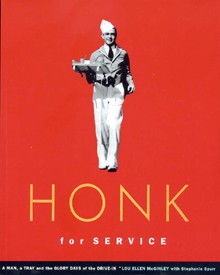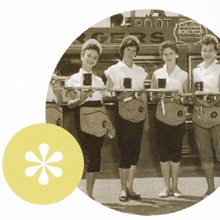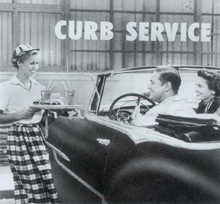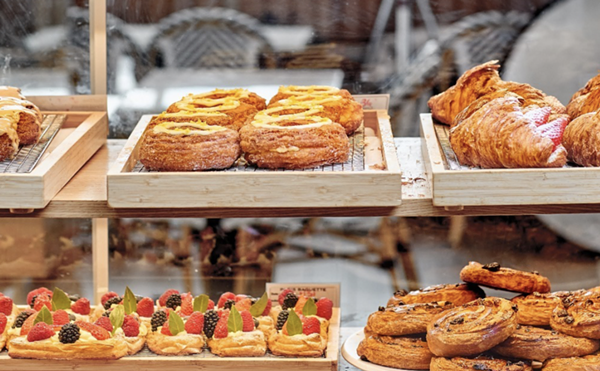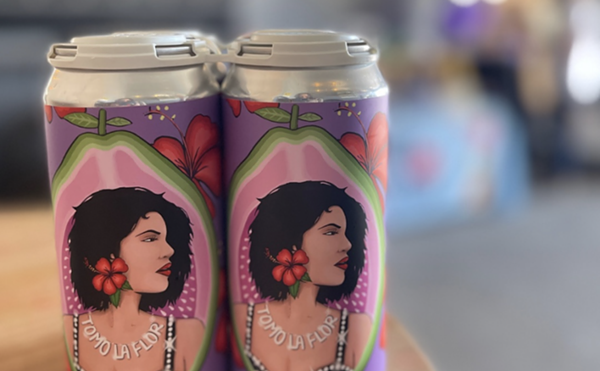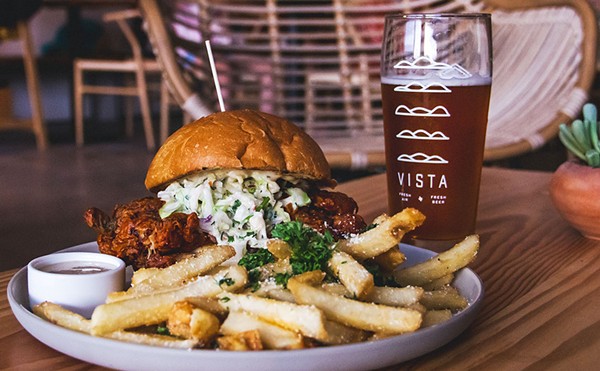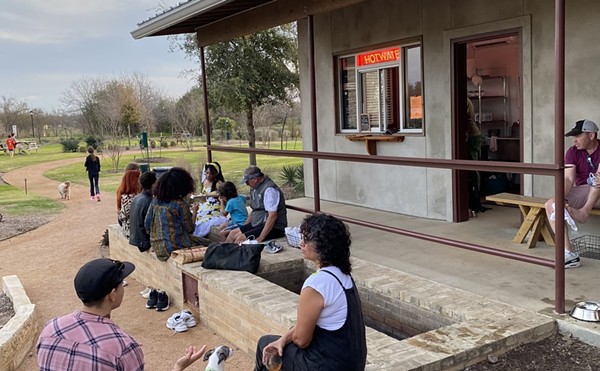An entrepreneur's ephemera tells the story of the drive-in era
| |
"I'd emptied out all of the file cabinets and was sitting there exhausted in a lump. You know how sometimes a notion comes in your head: It was get up and go look in that cabinet one more time. Well I did, and there was this little inch-and-a-half square picture on the bottom of the drawer. It's as if my mother was left in the drawer and she was saying, Help, help! I'm still in here. And the picture ended up on page 24."
Lou Ellen McGinley is talking about the process of sifting through her father's copious files, nearly 50 years worth of ephemera - photos, letters, cigar rings, advertisements, wax-paper hamburger bags, and brochures. In the mid '20s, Louie McGinley marketed and sold the TraCo tray, an ingenious "one-legged affair" that hooked over the side of automobiles to support hamburgers and milk shakes, and helped launch the era of drive-ins. This week McGinley will appear at Barnes & Noble and Pig Stand to talk about her new book, HONK for service, based on her father's life.
"I ended up writing a lot of long, boring text," McGinley says of her initial efforts to get Louie's story on paper, "but that's good. A person ought to do that about family because when you are gone you're gone and others don't know."
| |
In 1923, Louie and his brother Mack were unsuccessfully selling Buicks when Mack came up with the idea of a car tray. His original drawing, on green Goad Motor Company stationery, featured an oak tray, with an extendable leg that rested on the running board of the car. It was called the Auto Soda Server. By 1925, Louie was selling an aluminum version of the tray full-time, while Mack had sold his share in the invention and was working at the Fort Worth Star-Telegram.
| From the mid '20s to the early '70s, carhops brandished their TraCo trays at drive-ins around the country, earning tips from curbside diners by performing impromptu dances and gymnastics - such as leaping over the hood of the car with a full tray of food. |
"My father wasn't inventing a franchise concept, he was saying, Here's this tray and some brochures on how to make money even if you start with nothing. People developed their own style."
Though it was flourishing in other parts of the country, in St. Louis, Missouri, Louie found the soda-fountain owners reticent to embrace curbside service. In fact, they told him there was no room for such an idea in all of St. Louis. "Missouri is the 'Show Me' state, so he had to open a restaurant for St. Louis to actually see what a drive-in was and how it worked in combination with indoor service," says McGinley.
Opened in 1930, the Parkmoor restaurant and drive-in became so popular for its great service and food - in one photo of an immaculate kitchen, a dapper Parkmoor chef cuts huge slabs of fresh beef into a meat grinder for 20-cent hamburgers - that Louie opened six more over the next 26 years.
| Honk for Service: A man, a tray and the glory days of the drive-in By Lou Ellen McGinley with Stephanie Spurr Tray Days Publishing (2004) $29.95 226 pages Readings 6pm May 20 Free Pig Stand 1508 Broadway 222-2794 3pm May 21 Free Barnes & Noble 12635 IH 10 West 561-0205 |
McGinley attributes the end of the drive-in era to several factors: fast-food stands, the economic reality that customer turnover is key to financial success, and the '60s, a period she jokingly refers to as "fraught with peril," when young people took advantage of that same relaxed atmosphere to blast their rock 'n' roll, drink, and take drugs, which eventually scared off the families.
But then she rushes to change the subject, proudly talking about what today's young chefs are doing with owner-operated restaurants as if they are her own children. She's more interested in the future than mourning the past. "I hate when old folks say, Ain't it awful it isn't like it used to be?" •
By Susan Pagani

